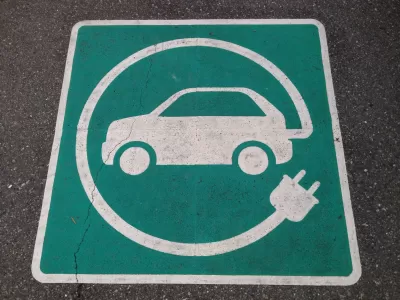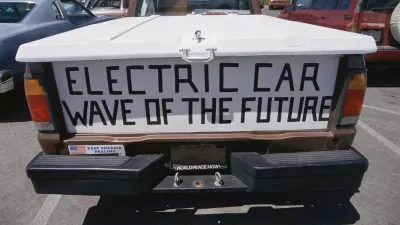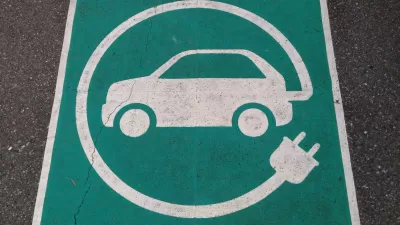To reach an ambitious net-zero target for transportation emissions in San Francisco, Mayor Breed and two supervisors introduced legislation to require large parking facilities provide electric vehicle charging for 10% of spaces.

"San Francisco officials want to shrink the city’s carbon footprint by eliminating the greenhouse gases belched from cars, trucks and other vehicles by 2040," reported
The city will take the first step toward that goal Tuesday,, when Mayor London Breed and Supervisors Vallie Brown and Aaron Peskin introduce legislation to install more electric-vehicle charging stations in both public and private parking lots and garages
San Francisco’s pending legislation, which city officials believe to be the first of its kind in the country, would require private parking lots and garages with more than 100 parking spots to install electric-vehicle charging stations next to at least 10% of the spaces. The ordinance would apply to about 300 commercial parking facilities in the city whose owners would have until 2023 to install the new stations.
Daniel Montes reports after the meeting for SF Bay that the legislation was introduced.
Lack of charging stations is one barrier to increasing adoption of electric vehicles. The city will attempt to sweeten the pot with incentives, such as reducing parking rates for EVs and removing barriers to installing chargers at residences, adds Fracassa.
State legislation to reform rebate program
On the state level, Assemblyman Phil Ting of San Francisco announced on July 8 that he amended current legislation to make the state's Clean Vehicle Rebate Project more sustainable and attractive to car consumers. Cap-and-trade revenue is the source of funds for the rebate program.
AB 1046 also requires the state to identify a steady rebate revenue stream so consumers are guaranteed their rebate, instead of being put on a waiting list when funds run out. The program is currently funded year-to-year with no guarantee lawmakers will continue the appropriation, or at what level.
Too often, potential buyers have been discouraged when rebates are not immediately available and postponed their transition to clean cars.
Ting, a strong advocate for increasing sales of electric vehicles, proposed legislation in 2017 to increase the value of the state rebates and authored bills last year and this year to ban sales of light-duty vehicles powered by internal combustion engines by 2040. None have passed.
Related in Planetizen:
-
Funding for Electric Vehicle Rebates Approved in California, September 19, 2017
-
How Much Is Too Much for a State Electric Vehicle Rebate? August 29, 2017
Hat tip to MTC Headline News.
FULL STORY: To cut carbon footprint, SF moves to eliminate vehicle emissions by 2040

Study: Maui’s Plan to Convert Vacation Rentals to Long-Term Housing Could Cause Nearly $1 Billion Economic Loss
The plan would reduce visitor accommodation by 25,% resulting in 1,900 jobs lost.

Alabama: Trump Terminates Settlements for Black Communities Harmed By Raw Sewage
Trump deemed the landmark civil rights agreement “illegal DEI and environmental justice policy.”

North Texas Transit Leaders Tout Benefits of TOD for Growing Region
At a summit focused on transit-oriented development, policymakers discussed how North Texas’ expanded light rail system can serve as a tool for economic growth.

Paris Bike Boom Leads to Steep Drop in Air Pollution
The French city’s air quality has improved dramatically in the past 20 years, coinciding with a growth in cycling.

Why Housing Costs More to Build in California Than in Texas
Hard costs like labor and materials combined with ‘soft’ costs such as permitting make building in the San Francisco Bay Area almost three times as costly as in Texas cities.

San Diego County Sees a Rise in Urban Coyotes
San Diego County experiences a rise in urban coyotes, as sightings become prevalent throughout its urban neighbourhoods and surrounding areas.
Urban Design for Planners 1: Software Tools
This six-course series explores essential urban design concepts using open source software and equips planners with the tools they need to participate fully in the urban design process.
Planning for Universal Design
Learn the tools for implementing Universal Design in planning regulations.
Smith Gee Studio
Alamo Area Metropolitan Planning Organization
City of Santa Clarita
Institute for Housing and Urban Development Studies (IHS)
City of Grandview
Harvard GSD Executive Education
Toledo-Lucas County Plan Commissions
Salt Lake City
NYU Wagner Graduate School of Public Service





























